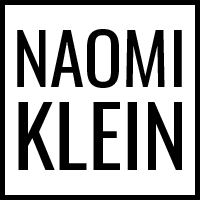23 Sep Once Strip-Mined, Twice Shy
September 23rd, 2003
By Naomi Klein
It used to be that if there was one thing you could count in matters of international trade, it was the desperation of the poor. No matter how bad the deal, it was always better than nothing.
But all of a sudden, poor countries are busting up trade rounds, standing up to the International Monetary Fund, and turning down foreign investment. What’s going on? Is it possible that when you’ve lost enough, desperation turns into defiance?
Take the people of Esquel, a small city in Southern Argentina. A year ago, the U.S-Canadian gold mining company Meridian purchased Britain’s Bancote Holdings, which owned a gold deposit in Esquel estimated at (U.S.) $1-billion. The time seemed to be right to build a huge open pit mine: gold was selling high and Argentina, with its ravaged economy, was selling low.
The company informed the city of Esquel that it was about to be the lucky recipient of 400 mining jobs. It slapped together an Environmental Impact Assessment, assured the community that using 2700 kg of cyanide a day was no riskier than driving to work, and got ready to start digging.
So did the community. Not for gold, but for information. Selling off natural resources and public services to foreign multinationals has not worked out well for Argentina. These investments, far from delivering the promised prosperity, have left the country with fewer jobs, soaring debts, expensive services, and suspiciously wealthy politicians. When Meridian said “trust us,” Esquel was unable to comply.
Esquel is located in a striking part of Patagonia, surrounded by rivers with spectacular fly fishing, mountains boasting world-class skiing, and the Alerces National Park. The mine site is just seven kilometres from the city of 32,000 people, raising serious concerns about what impact the use of cyanide and other toxins would have on the local water supply, as well as the ranching and tourism industries.
With so few details coming from the company, the community sought out its own mining experts. It learned that open pit gold mining using cyanide is banned in Montana. That when cyanide is broken down using the proposed INCO “destruction” process, it continues to contain toxins, and spills are still disastrous.
Greenpeace Argentina helped commission an independent study to assess the claims made in Meridian’s Environmental Impact Assessment. Dr. Robert Moran, the U.S. mining expert, states that, “This is the most ‘undefined’ EIA I have reviewed in more than 30 years of hydrogeologic experience.” According Dr. Moran, the information was so “nebulous” that it “certainly would not be acceptable to regulators in western European countries, the U.S.A. or Canada.” In an interview, Dr Moran said that “the biggest issue is water supply” — the buying of up of water rights leading to price hikes and scarcity.
Beyond these health and ecology concerns, many in Esquel simply believe that the mine is yet another bad deal for Argentina. Opponents say the company, headquartered in Reno, Nevada, won’t pay taxes for the first five years (the project is only projected to last for nine). They also claim that the government will pay out more in export rebates than it will receive in mining royalties. Most worrisome, if the site starts leaking after the mine closes, the community may well be stuck paying for the clean up.
On March 23, the town of Esquel held a referendum on the mine. Seventy-five per cent of the population turned out; 81 per cent voted “No” to the mine. Although the results of the referendum are non-binding, with provincial and municipal elections coming up, they are persuasive. Local politicians have not granted the permits Meridian needs to begin construction and the project is stalled.
Meridian, so tantalizingly close to its billion-dollar prize, is going to great lengths to prove it has learned from past mistakes. Immediately after the referendum, it hired the San Francisco-based Business for Social Responsibility to “help the company listen and understand the concerns of the community.” Last month, Meridian released BSR’s finding.
The BSR report, dismissed by many in Esquel as a public relations stunt, does not address the substantive ecological and economic issues. Instead, it blasts the company for its “striking lack of consistent and comprehensive engagement.” According to the report, accepted by Meridian, its employees displayed “an attitude of disregard” for the community and were “defensive and dismissive” of concerns, even downright rude. “The company was reluctant to share information about the proposed mine… in fact sometimes made it difficult to obtain information,” the report states.
Meridian accepted its lashings and committed itself to transparency and information sharing in the future. The company says that its activities are “on pause” and that it won’t move forward “without the support of the Esquel community.”
Meridian execs do sound like contrite twelve steppers these days. Speaking softly, Investor Relations Manager Deborah Liston tells me that the company has learned “a painful lesson… It’s a quiet time right now.” Her boss, Peter Dougherty, vice president, Finance and Chief Financial Officer, also talks about “waiting for the community” and says that “sometimes when there are struggles they define who you are at the end of the day.”
But there is evidence that Meridian hasn’t entirely changed its ways. Despite claims that the development is “on pause,” Meridian has quietly registered a new mine site just four km from the city of Esquel, even closer than the last one.
And despite all the talk of full transparency, the company may still be withholding key information from the public. Meridian has long promised to produce a comprehensive, independent water study, crucial to the community’s ability to assess the mine’s risks. Five months past the deadline, Esquel is still waiting. So I was surprised when Ms. Liston mentioned that she had seen the study, that the results were favourable to the company, but that “we haven’t released it yet. It’s not the right time. Right now they [the public] don’t want to hear that.”
When I ask Mr. Dougherty about Ms. Liston’s comments, he denies that the company is interfering with the study’s release, since that would “compromise its independence.” He said it, not me.
And what happens if, after all of the listening and hand-holding, the city still doesn’t want an open pit gold mine? Will Meridian leave Esquel, as the community is demanding, respecting the democratic wishes of its citizens?
“Look,” Mr. Dougherty says, departing from the new-age talking points, “we’re on this earth and if it isn’t growing we are going to have to mine it… Our entire planet has been formed on the ability of gold to form empires. Gold is a stabilizing factor throughout time.”
It’s an appropriate historical reminder. Meridian rode into Esquel like modern day conquistadors, convinced that its desperate people would be grateful to feed someone else’s empire. But economic crisis has not just made Argentines more desperate, it has also made them more savvy, more inclined to look past the shiny promises of future prosperity and protect what they have left.
After all, when your entire country has been strip-mined, you tend to be wary of saviours wearing hard hats.



